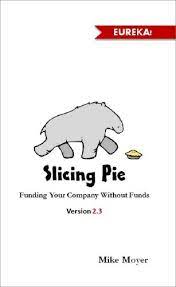
Slicing Pie is the name given to a dynamic equity sharing model developed by Chicago economics professor, Mike Moyer, for early-stage startups to share equity fairly.
It’s based on game theory and encourages teams to do right by each other. How? By ensuring that everyone gets the equity share that they deserve.

Why bother? You could just share equity equally, right? Yes – and if you always work, do, and put in exactly the same, this would make sense…But what if you do different things, or someone puts in more hours or cash? Or starts slacking off, or – whisper it – leaves? Is the original split you all agreed to still fair? Hmm…not so much. Because things always change. So unless you have a crystal ball, it’s impossible to agree fixed shares at the outset that ensure all will stay happy long-term. You could re-negotiate and, e.g. issue more shares, or ask a leaver to give some or all back. But how many…? And what if you don’t all agree…? #awkward.
This is where Slicing Pie comes in. The Slicing Pie dynamic model helps teams avoid bad equity splits, painful negotiations, drama and fallout. Ugh. The #1 reason nearly two-thirds of startups fail is because of people problems. Slicing Pie is therefore a great way for teams to start up efficiently and fairly, and increase their odds of success.
Basically, unlike fixed equity agreements which can become unfair over time, founders’ equity stakes change with their unrecompensed inputs (e.g. unpaid time, cash etc.), and good/bad leaver provisions are built in. Once participants track their inputs, Slicing Pie calculates everyone’s relative equity shares dynamically at any given moment. It therefore solves heaps of business conundrums, including:
Slicing Pie is fair, open and transparent. It avoids needing anyone to predict the future, or to negotiate fixed shares. And it encourages everyone to work, and spend wisely – which investors also love btw. It therefore works brilliantly for entrepreneurs and bootstrapping startups that:
And used to its fullest potential, it also helps teams communicate well, manage performance, and increase trust.
Slicing Pie is used by thousands of entrepreneurs worldwide, and hundreds in the UK so far, across a wide range of sectors, including tech, engineering, healthcare, education, fintech and professional services. Most are leaders, innovators and disruptors in their particular fields, and many are successful serial entrepreneurs. You can find out more about the sorts of startups we help here.
Slicing Pie is great for any early-stage startup that:
In many cases, it’s also possible to retrofit Slicing Pie in startups that may have used fixed equity to begin with. Awesome!
The best way to understand Slicing Pie is to read it. It’s easy, saves time, and the original book is free on Kindle/Audible – or you can buy a hard copy and share it.
Then the next thing to do is to set up a pie and give it a try. It’s a great way to see it working in practice, and you can also do this for free. Check out our tips for doing so here.
Doing these two things will go a long way to helping you work out whether Slicing Pie is right for you and your business.
And if after that, you have:
"Very quickly the problems of fixed splits became apparent, and with a few difficult conversations, we could already see how this kills so many startups. There we were, friends, almost arguing over how to split something worth nothing. There had to be a better way. Thank you Mike Moyer and Slicing Pie. We immediately saw the benefits and [. ] we were sold!"
- OAZ, co-founder, UK (2020)
"My friend and I started our business circa four years ago. We made all the classic mistakes: a handshake deal, 50/50 split, one share each, no discussion as to roles/commitment, etc. We'd never started a business before. Things were getting very tense over recent months as I (at long last) poked the bear and demanded that things be rebalanced fairly. We were struggling to find a mutually agreeable way forward and how to reconcile money invested vs unpaid time spent (I've done the vast majority). Then I discovered Slicing Pie and it's 90% of the way to saving our bacon, friendship & company."
- SMM, co-founder, UK (2022)